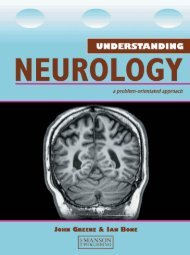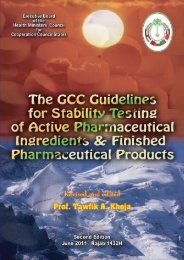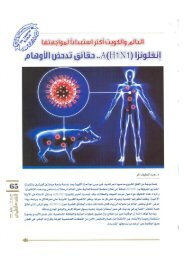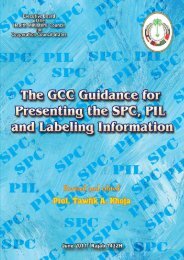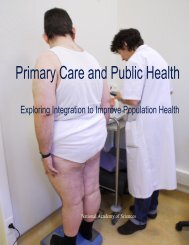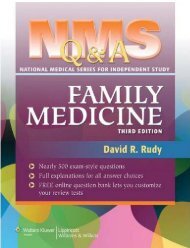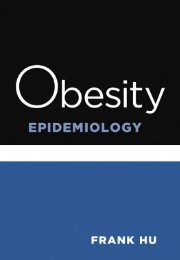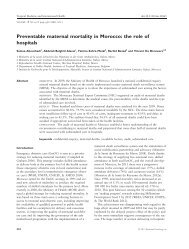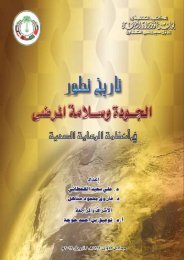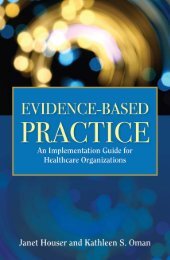Preventing Childhood Obesity - Evidence Policy and Practice.pdf
Preventing Childhood Obesity - Evidence Policy and Practice.pdf
Preventing Childhood Obesity - Evidence Policy and Practice.pdf
You also want an ePaper? Increase the reach of your titles
YUMPU automatically turns print PDFs into web optimized ePapers that Google loves.
CHAPTER 22<br />
Knowledge t ranslation <strong>and</strong> e xchange for<br />
o besity p revention<br />
Rebecca Armstrong, 1 Lauren Prosser, 1 Maureen Dobbins 2 <strong>and</strong> Elizabeth Waters 1<br />
1 Jack Brockoff Child Health <strong>and</strong> Wellbeing Program, McCaughey Centre, Melbourne<br />
School of Population Health, University of Melbourne, Melbourne, Australia<br />
2 School of Nursing <strong>and</strong> Department of Clinical Epidemiology <strong>and</strong> Biostatistics, McMaster<br />
University, Hamilton, Canada<br />
Summary <strong>and</strong> recommendations<br />
for research <strong>and</strong> practice<br />
• Knowledge translation <strong>and</strong> exchange (KTE) processes<br />
are intended to facilitate the creation <strong>and</strong><br />
application of knowledge.<br />
• To best support obesity prevention knowledge<br />
translation <strong>and</strong> exchange processes need to involve<br />
governments, communities (including children <strong>and</strong><br />
their parents), practitioners <strong>and</strong> researchers who are<br />
holders of implicit <strong>and</strong> explicit knowledge.<br />
• Tools <strong>and</strong> strategies are available to support the<br />
many purposes of KTE.<br />
• Refl ection on the application of KTE tools <strong>and</strong> strategies<br />
is necessary, in order to build the research<br />
evidence in this area <strong>and</strong> to support evidence -<br />
informed approaches to obesity prevention.<br />
Introduction<br />
As discussed in previous chapters, the need for an<br />
evidence - informed approach to obesity prevention is<br />
challenging but essential. Using research evidence in<br />
decision-making processes is often termed “evidencebased<br />
practice ” , stemming from the principles of<br />
<strong>Preventing</strong> <strong>Childhood</strong> <strong>Obesity</strong>. Edited by<br />
E. Waters, B.A. Swinburn, J.C. Seidell <strong>and</strong> R. Uauy.<br />
© 2010 Blackwell Publishing.<br />
evidence - based medicine ( EBM ). EBM typically<br />
involves the “ conscientious, explicit, <strong>and</strong> judicious use<br />
of current best evidence in making decisions about the<br />
care of individual patients ”. 1 In more recent times,<br />
<strong>and</strong> in domains such as public health where research<br />
evidence is more complex, the term “ evidence -<br />
2<br />
informed ” has been favoured. <strong>Evidence</strong>-informed<br />
decisions should be “ better matched to the context of<br />
application, more efficiently implemented, <strong>and</strong> more<br />
widely acceptable. ”3 While EBM has an implied<br />
emphasis on research evidence forming the basis<br />
of decision making, “evidence-informed” decision<br />
making more clearly acknowledges that public health<br />
decisions are often informed by research evidence in<br />
combination with a range of alternative sources <strong>and</strong><br />
influences. 4<br />
<strong>Obesity</strong> prevention is likely to be best supported<br />
with the use of multi - sectoral approaches across multiple<br />
disciplines. The challenge for obesity prevention<br />
is that interventions are facilitated through policies at<br />
the national, state/provincial, regional <strong>and</strong> local level.<br />
This necessarily involves the generation <strong>and</strong> synthesis<br />
of existing research evidence in combination with<br />
practitioner expertise, policy imperatives <strong>and</strong> community<br />
experiences. Given the number of key stakeholders<br />
involved in this trajectory between knowledge<br />
generation, synthesis <strong>and</strong> use, “ knowledge translation<br />
<strong>and</strong> exchange ” has become particularly important.<br />
The process of knowledge translation <strong>and</strong> exchange is<br />
thus, extremely complex. Initially it was believed that<br />
evidence - informed decision making could be achieved<br />
184



